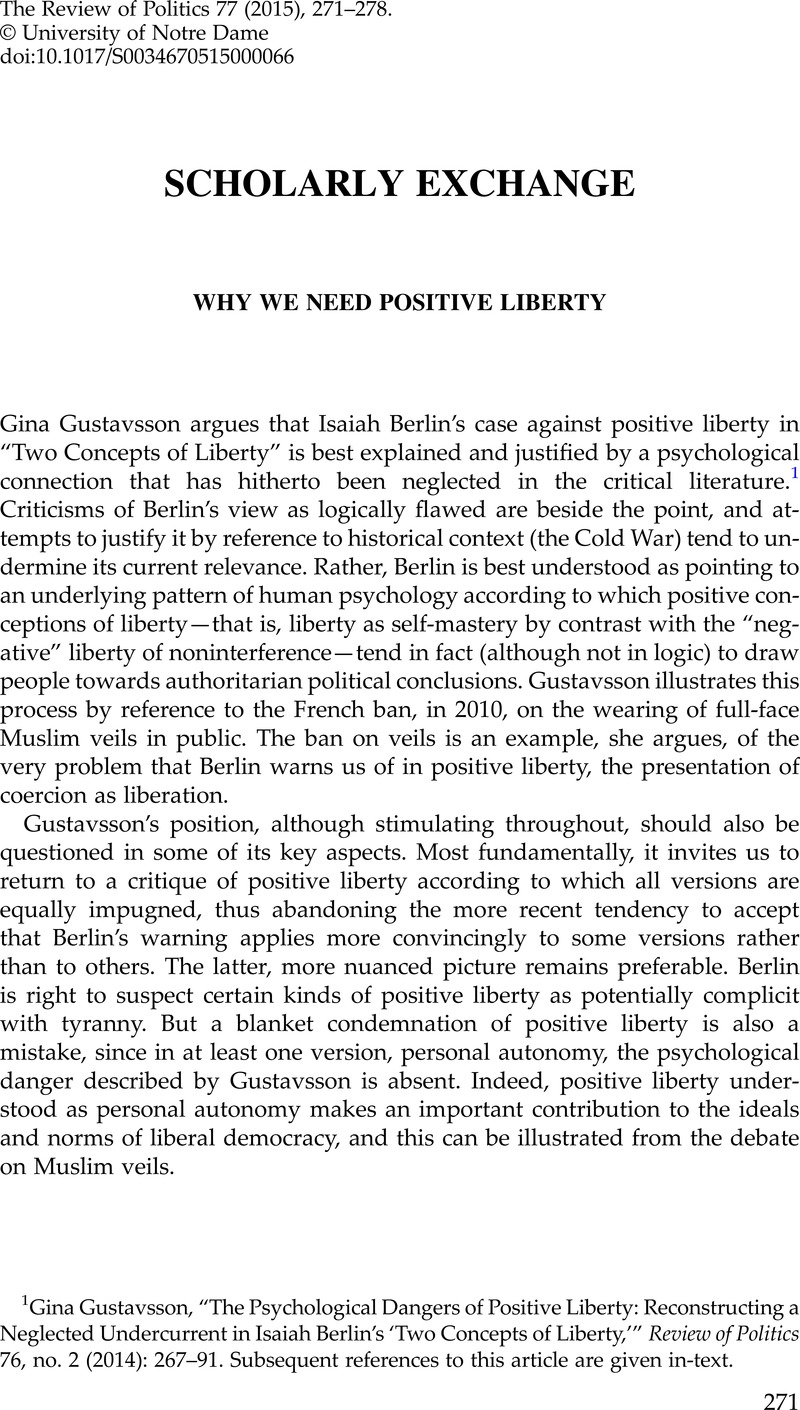Article contents
Why We Need Positive Liberty
Published online by Cambridge University Press: 20 April 2015
Abstract

- Type
- Scholarly Exchange
- Information
- Copyright
- Copyright © University of Notre Dame 2015
References
1 Gustavsson, Gina, “The Psychological Dangers of Positive Liberty: Reconstructing a Neglected Undercurrent in Isaiah Berlin's ‘Two Concepts of Liberty,’” Review of Politics 76, no. 2 (2014): 267–91CrossRefGoogle Scholar. Subsequent references to this article are given in-text.
2 Berlin, Isaiah, Liberty, ed. Hardy, Henry (Oxford: Oxford University Press, 2002)CrossRefGoogle Scholar, 180. According to Gustavsson, the theme of the inversion of liberty “tends to be overlooked” in the critical literature (272), but this is not true. The inversion theme is an absolutely routine part of any competent account of “Two Concepts.” See, e.g., the references in Gustavsson's own note 19.
3 See the references given by Gustavsson, n28.
4 Mill, John Stuart, On Liberty, ed. Himmelfarb, Gertrude (Harmondsworth: Penguin Books, 1974)Google Scholar, chap. 3.
5 Christman, John, “Liberalism and Individual Positive Freedom,” Ethics 101 (1991): 345CrossRefGoogle Scholar.
6 Berlin, Liberty, 179–80.
7 Berlin, Isaiah, The Crooked Timber of Humanity: Chapters in the History of Ideas, ed. Hardy, Henry (London: John Murray, 1990), 8Google Scholar; Berlin, The Power of Ideas, ed. Hardy, Henry (London: Chatto & Windus, 2000), 6Google ScholarPubMed.
8 Cannadine, David, The Undivided Past: History beyond Our Differences (London: Penguin Books, 2013), 44–47Google Scholar.
9 Hirschmann, Nancy, The Subject of Liberty: Toward a Feminist Theory of Freedom (Princeton: Princeton University Press, 2003), 191Google Scholar. Hirschmann refers to the hijab (a generic term for modest female dress, usually a headscarf leaving the face exposed) rather than specifically to the full-face veil (burqa or niqab) that is the subject of the French ban, but it seems to me that the same principle applies. Although Hirschmann does not explicitly use the term “positive liberty” in connection with veiling, she does link it to feminist concerns more broadly in “Isaiah Berlin, Feminism, and Positive Liberty,” in Isaiah Berlin and the Politics of Freedom: “Two Concepts of Liberty” 50 Years Later, ed. Baum, Bruce and Nichols, Robert (New York: Routledge, 2013)Google Scholar.
10 Lukes, Steven, “Isaiah Berlin: In Conversation,” Salmagundi 120 (1998): 93Google Scholar; Berlin, Isaiah and Polanowska-Sygulska, Beata, Unfinished Dialogue (Amherst, NY: Prometheus Books, 2006), 120Google Scholar.
- 2
- Cited by


